The World is Our Classroom
In a world where hustle and bustle can often drown out the moments that truly matter, Estie Kessler is redefining the meaning of family adventure.
Rayle Rubenstein
Estie Kessler is an interior designer by trade. She and her husband Kovi are the parents of four young children, ages one through nine. Like all young parents, their lives until recently consisted of a frantic routine of school, work, extracurriculars, and events. And like all young parents, they had countless days when they felt like they didn’t have a minute to just breathe and enjoy their children.
So they made a drastic decision.
Last June, the Kesslers bid farewell to their community in Houston and set off on a yearlong journey through Europe. Theirs was not a decision fueled by wanderlust; rather, it was the manifestation of a deep desire to escape the chaos of their hectic lifestyle and truly experience life as a family.
Estie views travel as more than just ticking off destinations from a bucket list. Instead, it’s a conscious choice to explore, learn, and form lasting, meaningful memories. Every few weeks, the family settles in a different destination. They spend their time meandering through cobblestone streets and green pastures, sampling local kosher cuisine, and appreciating the wonders of the world through the lens of a slower pace.
With just one month left to their adventure, the Kesslers currently find themselves in Marbella, a charming coastal town in Southern Spain. Like their prior destinations, it’s picture-perfect, but more than the photo ops, Estie, and her family hope to emerge with a sense of wonder and gratitude that will accompany them long after they’ve returned to their regular routines.
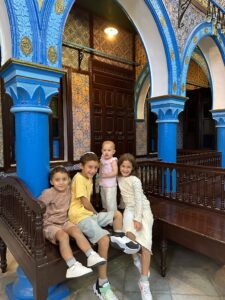
Can you tell us what spurred your decision to travel for a full year?
My husband and I moved from California to Houston about five years before we decided to travel. We were very happy with our new community, and we built a beautiful home. But we were always rushing everywhere, listening to the kids with half an ear. Even the weekends were busy. Kovi and I wanted to capture this time while our children are still young, and just spend time together. Our decision to travel was more like the result of our thinking process than a means of an end.
But why now?
Our oldest child is nine. They say that kids under the age of 10 still spend the majority of their time with their parents. They want to be with us, and they want to hear our stories and share things that happened in their day. As they grow older, their influence is more from their friends and peers.
So this was the perfect time to spend a year traveling abroad.
There is no such thing as the perfect time. I think that everyone has goals or dreams that seem unattainable. Then, before you realize it, life flies by, and your children are grown. My husband and I just decided to stop waiting and just do it while our kids were still young enough to want to be with us.
What made our decision easier was that we had tentative plans to move to Florida with my family that weren’t working out as expected. Our plans began to shift, and one night my husband and I were discussing the idea of traveling for a year. On a whim, I posted our home on a Facebook group I’m part of to gauge interest. The very next day, a family reached out to me, seriously interested in renting our home for the year. We thought about it and decided, “Let’s go for it!”
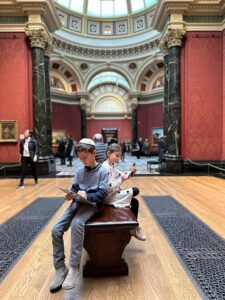
What was your first destination?
When our kids finished school last June, we went to California and spent the summer there with our family. Our first destination abroad was Djerba, an island off the coast of Tunisia. Djerba is known as the island of Kohanim because after the first Beis Hamikdash was destroyed, a group of Kohanim settled there. They carried with them pieces from the Beis Hamikdash and incorporated them into the construction of the shul there, which is called El Ghriba. We loved the opportunity to bring the children along and share this incredible experience with them, literally walking through history together. Djerba’s beaches are stunning, and we enjoyed a beautiful Sukkos program on the island. Then October 7 happened, which was particularly frightening because Djerba is part of an Arabic country.
We didn’t experience anything anti-Semitic, but shortly after we left, the shul on the mainland of Tunis was vandalized and set on fire.
Where did you go next?
We flew to the south of France. We’d been there before and wanted to spend more time there. We rented a gorgeous house in a medieval village near Saint Tropez, where there was a Chabad with a kosher market. Everything was quaint and tidy, and there were flowers everywhere; it felt like we were in a storybook. We spent some time exploring the region, in places like Antibes and Cannes. We went to Marseilles for a few days, which has the second-largest Jewish population in France after Paris.
From there, we went to Vienna and Budapest, spending a week in each. Those were beautiful in a very different way, and also very haunting. One thing that stood out for me was “Shoes on the Danube”, a chilling memorial with dozens of shoes affixed at the edge of the river in memory of the Jews who were murdered there. It’s one thing to read about these things in textbooks, but when you’re standing there with the knowledge that Jews stood right there not that long ago and were shot into this very river, it’s unthinkable. Budapest also has what I believe is the largest synagogue in Europe, and that too has a very tragic history. Right next to it is a mass grave for more than 2000 victims of the Budapest ghetto who were found after the war ended.
There were many vibrant, happy parts of Jewish history and Jewish life there as well. Some of the best kosher restaurants we encountered were in Budapest and Vienna. We loved the food there. There was a lot of beautiful architecture, and the museums were just incredible. Walking through them and seeing the artwork was one of my favorite experiences.
We visited these cities in December, and the weather was frigid. It snowed one day, which was exciting for us because we rarely see snow, but the temperature was hard for us to adjust to. We bundled up well, though, and it’s all part of the experience!
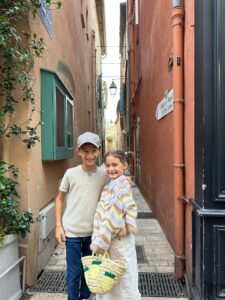
I hope you went to a warmer place after that!
We returned to the South of France, where my family joined us for a week, after which we all visited Paris together. Then we were off to England, where we stayed in three different places. The first house was outside of London, in Kent County, which is about an hour from the center of the city. Our next home was in Westgate-on-Sea, a picturesque seaside town. And then we visited London for a few weeks.
At that point, we took a little break in Los Angeles to recenter ourselves, repack a bit to accommodate the changing seasons, and spend time with family. Our relatives, especially my grandparents, were worried about us traveling through Europe after October 7, and it put them a little more at ease to see us happy and healthy.
We spent Pesach in Italy at a beautiful program on the Amalfi coast and spent some time in Rome after Yom Tov before moving on to Marbella.
How long are you staying in Marbella, and what’s next?
We’ll be here for a month. We’re planning to head to Greece next. We haven’t booked anything yet so that might change, but that’s the plan. For now, we’re enjoying Marbella. It’s a beautiful place, and the locals are friendly and welcoming. There’s a Chabad close to where we’re staying, and the rabbi there has been very helpful. There are a few kosher restaurants here and a small kosher market.
Is proximity to kosher food a significant factor in choosing your destinations?
Food is a big part of our experience. It’s hard to always eat on the go and be stuck with foods like cheese and crackers. Sometimes, that’s what we’ve got to do, but it makes everyone feel more satisfied and settled when there are proper meals. We enjoy trying out the local cuisine; it allows us to experience each place we visit more acutely.
What else influences your decision of where to travel?
We have to consider visa logistics. You can only stay within the Schengen area, which includes 29 European countries, for three months without a long-stay visa. So after our three months there, we opted for England which is not in Schengen. Originally, we planned to visit Israel during that time but were unable to because of the war. That was also part of the reason we returned to Los Angeles before resuming our trip. As the weather warmed up, we chose a location by the sea, which is our kids’ favorite place to be.
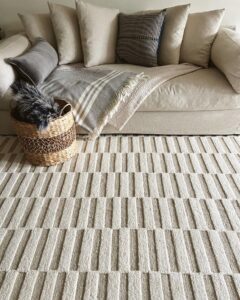
How did you navigate language barriers along the way? Do you speak other languages?
I speak Russian fluently, and I can hold my own in French and Hebrew. Between the three – plus English – we were able to get by quite well.
Did you experience any anti-Semitism in all your travels?
I can’t say that we have, thank G-d. We have not had any unpleasant experiences. Marbella is an especially friendly place. People greet us with “Shalom” and seem very receptive to us as Jews. Just today, we visited Gibraltar, and while we were at the top of the famous Rock of Gibraltar (where you have the rare opportunity to make a brachah on the meeting of the Atlantic Ocean and the Mediterranean Sea), a non-Jewish family from Norway came up to us and said, “Am Yisroel Chai. G-d bless you.”
When it came to finding places to stay did you have any less than pleasant experiences? Any surprises?
I’m part of a few Facebook groups that are good resources for finding homes to rent. There were a lot of gorgeous properties to choose from in the south of France, but it was a little tough to find a house in England. That’s why we ended up staying in Kent, which was not ideal because it’s not close to kosher food. It was beautiful though, in the countryside with horses nearby, and it turned out to have a very interesting history. We didn’t know when we booked it that it was owned by a Jewish family and built more than a century ago in a different location. A mudslide had moved the house but didn’t destroy it, and the entire house was transported to its current location.
That house had not undergone much modernization since it was built. It only had bathtubs – no showers – and the faucets were old-fashioned and tricky to use. That experience taught us to appreciate the modern conveniences we take for granted.
Are you able to provide a modicum of consistency and routine for your family with all this traveling?
It’s important to us to make our children feel as settled and comfortable as possible even while we are traveling. My husband and don’t like the idea of living in suitcases or constantly hopping from one place to another. We also don’t want our kids to feel anxious or unsure of what is going to happen next. We want them to feel grounded and like they have a home. We’ve stayed in each region for at least a few weeks, which allows us to maintain a routine and acclimate to our surroundings while still maintaining the excitement and wonder of discovering a new place. Our journey is not about traveling but more about enjoying a lifestyle where we can take things at our own pace and see everything in our own time.
What about social interaction?
It’s important to have your children feel that they have a social life. We miss that and are looking forward to regaining it when we return to the States. We did have some friends in France that we knew from before our travels, and we spent Chanukah with them. It made us realize what we were missing by being alone.
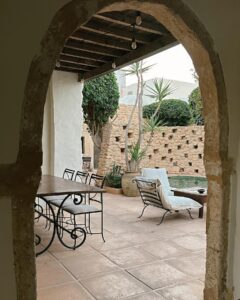
What arrangements have you made for schooling?
We spoke to their teachers and administration before we left and got a lot of workbooks, teaching aids, and basic curricula. We try to ensure that our kids are keeping up with everything. For secular subjects, they use books from Brain Quest, an awesome educational company, and each day they do a few pages on each subject. We learn Jewish subjects together and have a lot of discussion about it on Shabbos. Reading and writing are especially important, so our older kids read independently each day and write about their experiences and observations in journals they’ve been keeping throughout this time. Experiencing the world is part of their education. The kids love to learn and explore with us, and they’re well-rounded and curious. They’ve been great about visiting museums and synagogues, and they’re learning so much just by traveling and being exposed to all these different cool things.
Your children are still young, but do you feel that this arrangement would work well for older kids?
Our eldest child is in third grade. I believe that by fourth grade, he will need to be in a classroom setting. This is the last year I’d feel comfortable homeschooling for that reason. That was part of our consideration when we decided to travel.
Have there been moments in this journey when you’ve felt the need for a break?
Getting a babysitter and having a date night is something my husband and I used to take for granted. We haven’t had that in almost a year! We did have little breaks when my family came to visit, and when we went back to Los Angeles for a bit. That’s something we had to sacrifice to make this year work, but the flip side is that because we’re not rushing through life, we don’t need it as much. We’re not in the grind, and we’re relaxed.
It could also be because there’s a definite timeline for your travel, so you know there’s an end date approaching.
That is true. This is a choice that we made for this year, and before we know it, it’ll be over. We’re focused on appreciating and enjoying the present.
Could you walk us through how to pack for six people? How much luggage do you bring along?
Packing for Europe is challenging, especially when it comes to navigating those narrow cobblestone streets with suitcases or bags. Elevators are small and can only accommodate one suitcase at a time if they have an elevator at all. All of this means no overpacking! We started with six suitcases – one per person – and are now down to five because summer clothing is less bulky than winter gear. At some points, we left outgrown clothes in good condition with people who needed them; they were happy to have them, and we were glad to lighten our load.
I roll our clothes instead of folding them to save space. We travel in our coats to avoid packing them, even though that’s not always comfortable in a hot airport. We try to focus on the essentials, but we are always limited by space. I wish we were able to do more shopping, not for souvenirs but for items we could use in our home to remind us of this trip for years to come.
I’ve heard you mention that we should try to incorporate meaningful things we’ve collected along the way into our home decor.
Our homes are an extension of ourselves and the way we decorate is reflective of who we are. Even a disinterest in decorating is a form of expression. I love the idea of layering your home with things that have personal meaning. After this trip, I plan to look for things that are reminiscent of the places we’ve been and of things that inspired me. It’s not the same as finding things along the way, but they will still be meaningful.
You’ve spoken on your social media platforms about how our surroundings impact our lives and why it’s important for the Jewish home to be pleasant aesthetically. How have these beliefs been impacted in the context of your travel?
As an interior designer, my home is the focus of my personal and professional life. This year I don’t have a home, but I think all this traveling has cemented my ideas. The Jewish home is so important. It’s where everything takes place. The mezuzah on the front door demonstrates that there’s a higher purpose inside those walls. It’s not just a physical shelter; it’s a resting place for Hashem where we can do mitzvos.
That’s such a beautiful thought and it bridges the gap between caring too much about physical aesthetics and not caring at all.
The homes that we build provide the framework for our entire family experience. Hashem put us in a physical world, and we’re meant to enjoy and use the physical and elevate it into the spiritual. If you’re worshipping the physical, that’s too much. But if you’re using it to elevate your life, reflect your values, and make your home a beautiful and pleasant place for your family, I think that’s very much part of our avodah.
I love that message. How about your style? Has it changed? Have you seen anything you love or want to bring home?
I think that the home is always evolving just as we are always evolving into newer versions of ourselves. Your home should always be shifting, growing, and changing based on your experiences. My tastes have definitely shifted this year, and my next project will reflect that. I’ve been more drawn to color, and I’m excited to incorporate influences from abroad. I especially love handmade items, because there’s something special about an item that can’t be duplicated, and that ties into the idea of not wanting to rush. When things are copied, pasted, and mass-produced, that’s part of the rushed mentality. When something has been woven or painted by an artisan it adds a human touch that can’t be fabricated.
What do you want your children to emerge with from this year?
I want them to remember the places we’ve been and the experiences we’ve had, but even more than the memories, I want our experiences to be ingrained within them. I want them to soak in the experiences and learn to be resilient and flexible. We have to try new foods that we’re not necessarily used to and explore places that we didn’t know about. We have to walk sometimes instead of driving even if it’s hard. Those are really important life lessons, especially in our day and age when kids are so used to modern conveniences and ease of life. It’s good to go outside your comfort zone and learn to appreciate the different, beautiful, and amazing things in the world.
What do you look forward to most about resuming your routine?
I think just that: our routine. I’m excited for the kids to return to school, even though I’m loving this time with them. They miss their friends and teachers, and they were just talking about how they miss putting on their uniforms and getting ready in the morning, things like that. My husband and I will enjoy having time alone, and it will be nice to have some quiet and get work done. And of course, I will also look forward to everyone coming home in the evenings and being together again. There’s a healthy balance of being apart and then being together again.
You are very fortunate that you had the chance to give this year to your family. That is such a gift, and it’s not one that many people can pull off.
I truly feel grateful and lucky that we were able to do this. It has been a gift, and I hope it will leave a lasting impact in a very positive way for everyone in our family.
You must be logged in to post a comment.